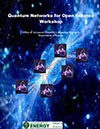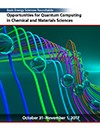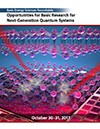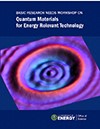SC-Sponsored Reports
Provided below is a listing of DOE Office of Science sponsored reports that address quantum information science used to help identify research directions relevant to the Office of Science.
 |
2024 Quantum Information Science Applications Roadmap Quantum information science (QIS) opens the door to revolutionize the way we process, store, and transmit information. The U.S. Department of Energy's (DOE) Office of Science plays a key role in QIS research & development (R&D). To inform QIS program activities, the Office of Science formed a committee of QIS experts spanning industry, academia, and DOE’s national laboratories to develop a roadmap for potential quantum applications relevant to DOE’s mission. The roadmap details technical challenges, guideposts, and milestones related to applications in quantum computing, quantum sensing, and quantum networks. December 2024: Report
|
 |
Report for the ASCR Workshop on Basic Research Needs in Quantum Computing and Networking In July 2023, DOE’s Advanced Scientific Computing Research (ASCR) program in the Office of Science convened the Workshop on Basic Research Needs in Quantum Computing and Networking. Employing quantum mechanical resources in computing, information processing, and networking opens the door to potential exponential advantages over classical counterparts. However, quantifying and realizing such advantages poses extensive scientific and engineering challenges. Department of Energy (DOE) investments have driven steady progress in addressing such challenges. Recently developed quantum algorithms offer asymptotic exponential advantages in speed or accuracy for fundamental scientific problems. These problems include simulating physical systems, solving systems of linear equations, differential equations, and optimization problems. The following five priority research directions (PRDs) were identified as a result of the workshop: end-to-end software tool chains to program and control quantum systems and networks at scale; efficient algorithms delivering quantum advantages; bench marking, verification, and simulation methods to assess quantum advantages; resilience through error detection, prevention, protection, mitigation, and correction; and hardware and protocols for next-generation quantum networks. |
 |
Quantum Sensors for High Energy Physics In April 2023, DOE’s High Energy Physics (HEP) program in the Office of Science held a workshop on Quantum Sensors for High Energy Physics. The goal of this workshop was to explore the most promising directions for applying quantum sensing technologies to HEP science targets, with a focus on sensors that could be deployed in future experiments. Quantum sensors can address the needs that arise in investigating phenomena beyond the Standard Model of particle physics. Experiments detecting these phenomena need to measure very small signals against potentially large backgrounds, challenges which could be addressed by quantum sensors including qubits, spin ensembles, atomic clocks, and interferometers. Despite these promising opportunities, there are significant challenges involved in deploying these sensors in real-world experimental environments – sensors are not always robust to environmental noise, high magnetic fields, or other conditions expected in HEP detection applications. The workshop identified a four-part strategy to optimize the utilization of QIS sensing technology for HEP purposes: workforce development, supporting and operating quantum device fabrication facilities, robust support for theoretical research, and a program to advance QIS detectors from proof-of-concept to scientific applications. April 2023: Workshop report
|
 |
From Long-distance Entanglement to Building a Nationwide Quantum Internet: Report of the DOE Quantum Internet Blueprint Workshop In February 2020, the U.S. Department of Energy (DOE)’s Office of Advanced Scientific Computing Research hosted the Quantum Internet Blueprint workshop to define a potential roadmap toward building the first nationwide quantum Internet. The workshop participants included representatives from DOE national laboratories, universities, industry, and other U.S. agencies with serious interests in quantum networking. The goal was to provide an outline of the essential research needed, detail any engineering and design barriers, and suggest a path forward to move from today’s limited local network experiments to a viable, secure quantum Internet. |
 |
Nuclear Physics and Quantum Information Science The Department of Energy (DOE) and the National Science Foundation (NSF) charged the Nuclear Science Advisory Committee (NSAC) to assess the potential benefits of QIS to NP research and the contributions that NP research can make to QIS. The NSAC QIS Subcommittee held two information-gathering meetings in the spring of 2019, which resulted in this report. |
 |
Quantum Networks for Open Science (QNOS) DOE’s Advanced Scientific Computing Research Program (ASCR) convened the Quantum Networks for Open Science (QNOS) Workshop in September 2018. The workshop was primarily focused on quantum networks optimized for scientific applications with the expectation that the resulting quantum networks could be extended to lay the groundwork for a generalized network that will evolve into a quantum internet (Q-Internet). |
 |
Fusion Energy Sciences Roundtable on Quantum Information Science DOE’s Office of Fusion Energy Sciences (FES) charged the fusion community to address the relationship of Fusion Energy Sciences and emerging QIS areas. A Roundtable was held in early May of 2018 to discuss Quantum Information Science in the FES context. |
 |
Opportunities for Nuclear Physics & Quantum Information Science This whitepaper is an outcome of the workshop Intersections between Nuclear Physics and Quantum Information held at Argonne National Laboratory on 28–30 March 2018. The workshop brought together 116 national and international experts in nuclear physics and quantum information science to explore opportunities for the two fields to collaborate on topics of interest to the U.S. Department of Energy (DOE) Office of Science, Office of Nuclear Physics, and more broadly to U.S. society and industry. The workshop consisted of 22 invited and 10 contributed talks, as well as three panel discussion sessions. Topics discussed included quantum computation, quantum simulation, quantum sensing, nuclear physics detectors, nuclear many-body problem, entanglement at collider energies, and lattice gauge theories. |
 |
Quantum Computing for Theoretical Nuclear Physics During a February 2018 workshop at the Institute for Nuclear Theory, a group of 39 scientists from academia, government, national laboratories, and industry gathered to discuss the future of quantum computing for nuclear physics. Researchers described the basic scientific challenges in quantum chromodynamics and quantum many body problems that could be addressed utilizing the power of quantum computing in the future. The group also discussed mechanisms for developing quantum-computing algorithms specifically for nuclear physics applications. This whitepaper provides a synopsis of the workshop discussions, and suggests possible activities that might be supported as part of a vibrant pilot program of nuclear physics research in this area. |
 |
Basic Energy Sciences Roundtable: Opportunities for Quantum Computing in Chemical and Materials Sciences This report is based on a BES Roundtable on Opportunities for Quantum Computing in Chemical and Materials Sciences, which was held October 31 – November 1, 2017. The goal of the roundtable was to identify opportunities for quantum computing (QC) to enable significant and impactful advances in understanding of important fundamental challenges in chemical and materials sciences, including major science challenges for BES that would be prime targets for future QC; common computational or algorithmic challenges in addressing these science challenges; and computational characteristics of current and future quantum computers relevant to addressing these challenges. |
 |
Basic Energy Sciences Roundtable: Opportunities for Basic Research for Next-Generation Quantum Systems This report is based on a BES Roundtable on Opportunities for Basic Research for Next-Generation Quantum Systems, which was held October 30-31, 2017. The goal of the roundtable was to define the unique roles for BES in quantum information sciences and to provide input on future research opportunities for basic materials and chemical sciences that will enable major advances in quantum-based science and technology. |
 |
ASCR Report on Quantum Computing Testbed for Science This report details the findings of the Quantum Testbed Stakeholder Workshop sponsored by the Department of Energy’s Advanced Scientific Computing Research Program to identify opportunities and challenges in establishing a quantum testbed to advance quantum computing hardware and software systems that will enable science investigations. The workshop was held on February 14 – 16, 2017 in Washington DC and served as a forum for individual stakeholders from academia, industry, national laboratories, and government to provide their perspectives and ideas on the overarching goals and objectives of a quantum testbed, technical considerations, and how a quantum testbed program would be synergistic with other nascent quantum computing efforts in the US and worldwide. This report summarizes discussions on best practices for management of various types of collaborative research activities, including topics such as workforce training and building strong relationships with the research community. It also reviews specific technologies that have been identified by the ASCR Program as being important for the success of a quantum testbed whose overall goal is advancing quantum computing for scientific applications in the next five years. |
 |
Information Science, and Computing The Offices of High Energy Physics (HEP) and Advanced Scientific Computing Research (ASCR) within the Office of Science at the Department of Energy (DOE) co-sponsored a Roundtable on “Quantum Sensors at the Intersections of Fundamental Science, Quantum Information Science, and Computing” on February 25th, 2016. The meeting brought together leading scientific experts at the “Quantum Frontier”—the rapidly growing and interdisciplinary field of quantum science and technology. Quantum Sensors are an integral part of the holistic and accelerating field of Quantum Information Science (QIS) that spans synergistic interests of multiple federal agencies. This report summarizes the background, opportunities, and challenges at the Quantum Frontier, provides suggestions for maximizing DOE impact in this field, and concludes with several ‘Case study’ reports of highlights from the Quantum Frontier. |
 |
Basic Research Needs Workshop on Quantum Materials for Energy Relevant Technology This report is based on a BES workshop on Basic Research Needs on Quantum Materials for Energy Relevant Technology, which was held on February 8-10, 2016. The workshop goal was to define priority research directions that would lay the foundation to better understand quantum materials and harness their rich technological potential. |
 |
DOE ASCR Workshop on Quantum Computing for Science This report details the findings of the DOE ASCR Workshop on Quantum Computing for Science on February 17 - 18, 2015 that was organized to assess the viability of quantum computing technologies to meet the computational requirements of the DOE’s science and energy mission, and to identify the potential impact of quantum technologies. |
 |
Grand Challenges at the Interface of Quantum Information Science, Particle Physics, and Computing A Study Group convened jointly by the Office of Advanced Scientific Computing Research (ASCR) and Office of High Energy Physics (HEP) in the Office of Science, DOE, met in Germantown, MD on December 11th, 2014. The Group was charged by the Associate Directors of both Programs to identify Grand Challenges, Opportunities, and Gaps in Research at the intersections of Quantum Information Science (QIS), Particle Physics, and Computing, including exploiting quantum systems, probing innovative future technologies, and using QIS as a window to the Universe. Their report presents a set of Grand Challenge questions along with potential paths forward for advancement of associated technology and fundamental science insight. |


